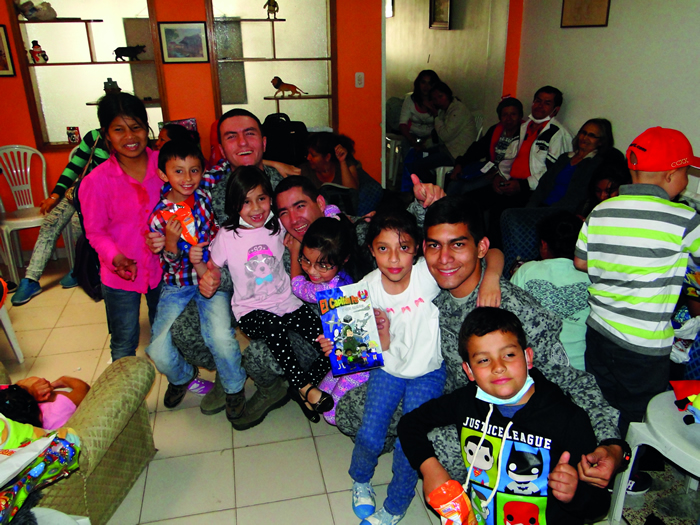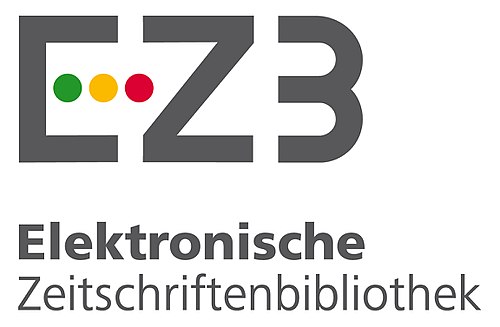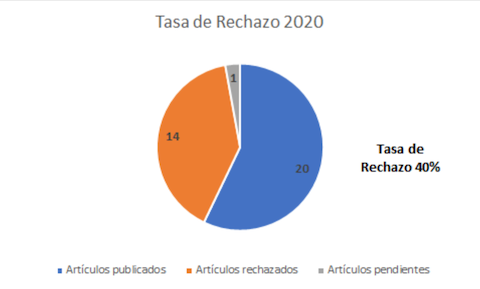Competência social em crianças e adolescentes na cidade de Bucaramanga (Colômbia) como escala Messy
DOI:
https://doi.org/10.18667/cienciaypoderaereo.425Palavras-chave:
adolescentes, competência social, crianças, escala MessyResumo
Muitos dos problemas de violência e intolerância estão associados com um déficit de mecanismos que permitam ao indivíduo funcionar de forma eficaz, portanto, tenta-se procurar ferramentas de relevância social para a definição dos fatores que moldam esses comportamentos, a fim de desenvolver metodologias para criar técnicas focadas nas habilidades assertivas que melhorem estas características individuais em cada pessoa. É por isso que este trabalho de pesquisa foi focado na identificação dos componentes da competência social que têm crianças e adolescentes na cidade de Bucaramanga, e a relação com as suas características demográficas (idade, escolaridade, estado socioeconômico). Se apresentou um estudo quantitativo, de correlação transversal. A amostra foi por conveniência, com um total de 330 participantes com idades entre 8 e 17 anos. Se aplicou a escala Messy e a análise dos resultados foi levada a cabo através do programa SPSS. Os resultados mostram que não é possível definir uma relação direta entre as habilidades sociais possuídas por um indivíduo e seus dados sócio demográficos, confirmando a influência de outros fatores multivariados no seu desenvolvimento.Downloads
Referências
Alberti y Emmos (1978). Teoría de la evaluación y entrenamiento de las habilidades sociales. Valencia: Promolibro.
Brussino, S. A. (2002). Análisis causal del comportamiento agresivo infantil: pautas de crianza, estilo atribucional, capacidad intelectual y habilidad social. Tesis no publicada para optar al grado de Doctor en Psicología, Universidad Nacional de Córdoba, Argentina.
Caballo, V. (1997). Manual de Evaluación y Entrenamiento de las Habilidades Sociales. Madrid: Siglo Veintiuno de España Editores, SA 224
Cavell, T. A. y Kelley, M. L. (1994). The Checklist of Adolescent Problem Situations. Journal of Clinical Child Psychology, 23, 226-238.
https://doi.org/10.1207/s15374424jccp2303_1
Cavell, T.A. (1990). Social adjustment, social performance and social skills: A Tri-Component Model of social competence. Journal of Clinical Child Psychology, 19,111- 122.
https://doi.org/10.1207/s15374424jccp1902_2
Chou, K. L. (1997). The Matson Evaluation of Social Skills with Youngsters: Reliability and validity of a Chinese translation. Personality and Individual Differences, 22, 123-125.
https://doi.org/10.1016/S0191-8869(96)00166-3
Connolly, J. (1989). Social self-efficacy in adolescence: Relations with self concept, social adjustment, and mental health. Canadian Journal of Behavioral Science, 21, 258- 269.
https://doi.org/10.1037/h0079809
Cummings, K. D., Kaminski, R. A. & Merrell, K. W. (2008). Advances in the assessment of social competence: Finding from a preliminary investigation of a general outcome measure for social behavior. Psychology in the Schools, 45, 930-946.
https://doi.org/10.1002/pits.20343
Davis, M., McKay, M. y Eshelman, E.R. (1982). Técnicas de autocontrol emocional. Barcelona: Martínez Roca.
Elliot, S.N., Sheridan, S.M. y Gresham, F.M. (1989). Assessing and treating social skills deficits: A case study for the scientist-practitioner. Journal of School Psychology, 27, 197- 222.
https://doi.org/10.1016/0022-4405(89)90007-1
Essau, C. A., Conradt, J. y Petermann, F. (1999). Frequency and comorbidity of social phobia and social fears in adolescents. Behaviour Research and Therapy, 37, 831-843.
https://doi.org/10.1016/S0005-7967(98)00179-X
Farrell, A. D., Ampy, L. A. y Meyer, A. L. (1998). Identification and assessment of problematic interpersonal situations for urban adolescents. Journal of Clinical Child Psychology, 27, 293-305.
https://doi.org/10.1207/s15374424jccp2703_6
Foster, S. L., Inderbitzen, H. M. y Nangle, D. W. (1993). Assessing acceptance and social skills with peers in childhood. Behavior Modification, 17, 255-286.
https://doi.org/10.1177/01454455930173003
Furnhamn, A. y Gunter, B. (1983). Gender and personality differences in self-reported social skills among British adolescents. Journal of Adolescence, 6, 57-69.
https://doi.org/10.1016/S0140-1971(83)80056-6
Furnhamn, A. (1984). Personality, social skills, anomie and delinquency: A self-report study of a group of normal non-delinquent adolescents. Journal of Child Psychology and Psychiatry, 25, 409-420.
https://doi.org/10.1111/j.1469-7610.1984.tb00160.x
Godoy, A., Gavino, A., Martorell, M. C. y Silva, F. (1993). Assertiveness Scale for Children and Adolescents En M. Forns and M. T. Anguera (Eds.), Recent contributions to psychological assessment (pp. 247-264). Barcelona: PPU.
Gresham, F. M. y Elliot, S. N. (1984). Assessment and classification of children's social skills: A review of methods and issues. School Psychology Review, 13, 292-301.
Gresham, F. M., Sugai, G. y Horner, R. H. (2001). Interpreting outcomes of social skills training for students with high-incidence disabilities. Exceptional Children, 67, 331-344
https://doi.org/10.1177/001440290106700303
Gresham, F.M. y Cavell, T.A. (1986). Assessing adolescent social skills. En R.G. Harrington (Ed.). Testing adolescents: A reference guide for comprehensive psychological assessments (pp.93-123). Kansas City: Test Corporation of America.
Hops, H. y Greenwood, C. R. (1988). Social skills dificits. In E. J. Mash y L. G. Terdal (Eds.). Behavioral assessment of childhood disorders (pp. 263-314). New York: Guildford Press.
Inderbitzen, H. M., Walters, K. S. y Bukowski, A L (1997). The role of social anxiety in adolescent peer relations: Differences among sociometric status groups and rejected subgroups. Journal of Clinical Child Psychology, 26, 338-348.
https://doi.org/10.1207/s15374424jccp2604_2
Inderbitzen, H. y Foster, S. L. (1992). The Teenage Inventory of Social Skills: Development, Reliability, and Validity. Psychological Assessment, 4, 451-459.
https://doi.org/10.1037/1040-3590.4.4.451
La Greca, A. M. y López, N. (1998). Social anxiety among adolescents: Linkages with peer relations and friendships. Journal of Abnormal Child Psychology, 26, 83-94.
https://doi.org/10.1023/A:1022684520514
Ledingham, J.E., y Younger, A.J. (1985). The influence of the evaluator on assessment
of children's social skills. En B.H. Schneider, K.H. Rubin, y J.E. Ledingham (Eds.), Children's Peer Relations: Issues in Assessment and Intervention (pp.111-124). New York: Springer-Verlag.
Matson, J. L. y Wilkins, J. (2009). Psychometric testing methods for children's social skills. Research in Developmental Disabilities: A Multidisciplinary Journal, 30, 249-274.
https://doi.org/10.1016/j.ridd.2008.04.002
Matson, J.L., y Ollendick, T.H. (1988). Enhancing children's social skills. New York: Pergamon Press.
Matson, J.L.; Rotatori, A.F., y Helsel, W.J. (1983). Development of a rating scale to measure social skills in children: the Matson Evaluation of Social Skills with Youngsters (MESSY). Behavior Research Therapy, 21(49), 335-340.
https://doi.org/10.1016/0005-7967(83)90001-3
Mayseless, O., Wiseman, H., y Hai, I. (1998). Adolescents' relationships with father, mother, and same-gender friend. Journal of Adolescent Research, 13, 101-123.
https://doi.org/10.1177/0743554898131006
McConnell, R.S., y Odom, S.L. (1986). Sociometrics: Peer referenced measures and the assessment of social competence. En P. S. Strain, M. J. Guralnick, y H. H. Walker (Eds.), Children's Social Behavior (pp. 215-284). New York: Academic Press.
https://doi.org/10.1016/B978-0-12-673455-3.50010-5
Meichenbaum, D., Butler, L. y Gruson, L. (1981). Towards a conceptual model of social competence. En J.D. Wine y M.D. Smye (Eds.), Social competence (pp. 36-59). Nueva York: The Guilford Press.
Méndez, F., Hidalgo, M. y Inglés, C. (2002). The Matson Evaluation of Social Skills with Youngsters. Psychometric properties of the Spanish translation in the adolescent population. European Journal of Psychological Assessment, 18, 30-42.
https://doi.org/10.1027//1015-5759.18.1.30
Merrell, K.W. y Gimpel, G.A. (1998). Social skills of children and adolescents: Conceptualization, assessment, treatment. Mahwah, NJ: Lawrence Erlbaum Associates.
Muñoz, A., Trianes, M.V., Jiménez, M., Sánchez, A., y García, B. (1996). La Escala de Observación para Profesores: Evolución y forma actual. En M. Marin y F.Medina (Comp.), Psicología del Desarrollo y de la Educación: La intervención educativa (pp. 565- 573). Sevilla: Eudema.
Pereira Del Prette, Z. A. y Del Prette, A. (2002). Psicología de las Habilidades Sociales: Terapia y Educación. Universidad Federal de Sao Carlos, Brasil Manual Moderno.
Pérez Fernández, J. y Garaigordobil Landazabal, M. (2004). Relaciones de la socialización con inteligencia, autoconcepto y otros rasgos de la personalidad en niños de 6 años. Apuntes de Psicología, 22 (2), 153-169.
Prieto Ursua, M. (2000). Variables psicológicas relevantes en el estudio de los menores con trastornos psíquicos. Ponencia presentada en el I Congreso Hispano-Portugués de Psicología, 21 al 23 de setiembre, Santiago de Compostela. Disponible en: http://www.fedap.es/congreso_santiago/ trabajos/mprieto2.htm
Salmivalli, C., Kaukiainen, A., Kaistaniemi, L. y Lagerspetz, K.M. (1999). Self- evaluated self-esteem, peer-evaluated self-esteem, and defensive egotism as predictors of adolescent's ' participation in bullying situations. Personality and Social Psychology Bulletin, 25(10), 1268-1278.
https://doi.org/10.1177/0146167299258008
Sánchez, V. y Lewinsohn, P. (1980). Assertive behavior and depression. Journal of Consulting and Clinical Psychology, 48(1), 119-120.
https://doi.org/10.1037/0022-006X.48.1.119
Segal, D. (2005). Relationships of assertiveness, depression, and social support among older nursing home residents. Behavior Modification, 29, 689-695.
https://doi.org/10.1177/0145445503259391
Spence, S. H. & Liddle, B. (1990). Self-report measures of social competence for children: An evaluation of social skills for youngsters and the List of Social Situation Problems. Behavioral Assessment, 12, 317-336.
Spence, S. H. (1980). Social skills training with children and adolescents:A counsellor's manual. Windsor: NFER Publishing.
Spence, S. H. y Marzillier, J. S. (1981). Social skills training with adolescent male offenders-II. Short-term, long-term and generalized effects. Behaviour Research and Therapy, 19, 349-368.
https://doi.org/10.1016/0005-7967(81)90056-5
Spence, S.H. y Liddle, B. (1990). Self-report measures of social competence for children: An evaluation of Social Skills for Youngsters and the List of Social Situation Problems. Behavioral Assessment, 12, 317-336.
Teodoro, M. L. M., Kaeppler, K. C., de Lima Rodrigues, J., de Freitas, P. M. & Haase, V. G. (2005). The Matson evaluation of social skills with youngsters (MESSY) and its adaptation for Brazilian children and adolescents. Interamerican Journal of Psychology, 39, 239-246.
Trianes, M. V., Blanca, M. J., Muñoz, A., Garcia, B., Cardelle-Elawar, M. y Infante, L. (2002) Relaciones entre evaluadores de la competencia social en preadolescentes: profesores, iguales y auto informe. Anales de psicología, 18, 197-214.
Trianes, M. V., Muñoz, A. M. & Jiménez, M. (1997). Competencia social: su educación y tratamiento. Madrid: Pirámide.

Downloads
Publicado
Edição
Seção
Licença
Declaração de cessão de direitos autorais à revista
O autor cede exclusivamente à Revista os direitos de exploração (reprodução, distribuição, comunicação pública e transformação) para explorar e comercializar a obra, no todo ou em parte, em todos os formatos e modalidades de exploração presentes ou futuros, em todas as línguas, por todo o período de vida da obra e pelo mundo inteiro.
Todo o conteúdo publicado na revista científica Ciencia y Poder Aéreo está sujeito à licença de reconhecimento internacional Creative Commons 4.0, cujo texto completo pode ser encontrado em http://creativecommons.org/licenses/by/4.0/
A licença permite que qualquer usuário baixe, imprima, extraia, arquive, distribua e comunique publicamente este artigo, desde que seja dado o devido crédito aos autores: ao(s) autor(es) do texto e a Ciencia y Poder Aéreo, Revista da Escola de Pós-Graduação da Força Aérea Colombiana. Exceto quando for indicado o contrário, o conteúdo deste site será licenciado sob uma licença Creative Commons Attribution 4.0 Internacional.
Para usos de conteúdo não previstos nestas normas de publicação é necessário entrar em contato diretamente com o diretor ou editor da revista através do e-mail cienciaypoderaereo1@gmail.com
A Escola de Pós-Graduação da Força Aérea Colombiana e esta revista não são responsáveis pelos conceitos expressos nos artigos, nem pelos metadados fornecidos ou pelas afiliações que os autores declarem, sendo assim de inteira responsabilidade dos autores.

Licença Creative Commons
Os autores concedem à revista os direitos de exploração (reprodução, distribuição, comunicação pública e transformação) para explorar e comercializar a obra, inteira ou parcialmente, em todos os formatos e modalidades de exploração presentes ou futuras, em todas as línguas, por todo o período de vida da obra e no mundo inteiro.
Todos os conteúdos publicados na revista científica Ciencia y Poder Aéreo estão sujeitos à licença de reconhecimento 4.0 4.0 Internacional de Creative Commons, cujo texto completo pode-se consultar em http://creativecommons.org/licenses/by/4.0/
A licença permite a qualquer usuário baixar, imprimir, extrair, arquivar, distribuir e comunicar publicamente um artigo, desde que seja dado crédito aos autores do trabalho: aos autores do texto e a Ciencia y Poder Aéreo, Revista Científica da Escola de Pós-Graduação da Força Aérea Colombiana. Salvo onde for indicado o contrário, o conteúdo deste site é licenciado sob uma licença Creative Commons Atribución 4.0 internacional.
Para usos de conteúdo não previstos nestas normas de publicação é necessário entrar em contato diretamente com o diretor ou editor da revista através do e-mail cienciaypoderaereo1@gmail.com
A Escola de Pós-Graduação da Força Aérea Colombiana e esta revista não são responsáveis pelos conceitos expressos nos artigos, nem pelos metadados fornecidos ou pelas afiliações que os autores declarem, sendo assim de inteira responsabilidade dos autores.




















